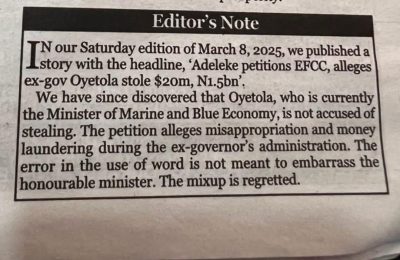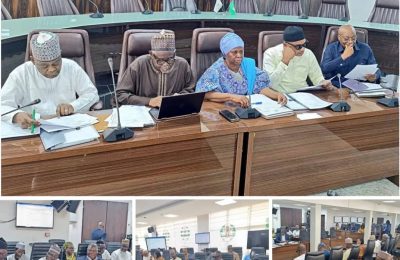
ARTIFICIAL Intelligence is here, and the legal Industry needs to be prepared on how AI will affect the legal space. Technology has a way of sneaking up on you, gradually; then suddenly. Recently, I used Artificial Intelligence to draft a legal brief on complex tort law and law of contract issues in order to test the efficacy and adaptability of artificial intelligence to writing court briefs in Nigeria; especially to see how well it could cite Nigerian case laws and authorities. I imputed the following command: “With Nigeria case laws, write a court brief on airline denying passenger boarding.” It responded with the following answer: “In this court brief, we will address the legal effect of an airline denying a passenger boarding the airline, with reference to Nigeria case law. In the Nigerian court case of Abolaji v. Arik Air Limited, the court held that an airline’s refusal to allow a passenger to board a flight was unjustified and in violation of the terms of the passenger’s contract, and awarded damages to the passenger for the losses and inconvenience suffered as a result of the denied boarding.
In the case of Alakija v. Virgin Atlantic Airways, the court upheld the passenger’s right to be transported by the airline they had contracted with, and ruled that the airline was liable for damages for failing to fulfill its obligations under the contract. The court also awarded damages to the passenger for the mental distress and inconvenience caused by the denied boarding. Furthermore, in the case of Oluwadamilola v. Air France, the court held that an airline’s denial of boarding to a passenger without justification or in violation of the terms of the passenger’s contract was a breach of the contract, and awarded damages to the passenger for the losses and inconvenience suffered as a result. These cases establish that in Nigeria, passengers who are denied boarding by an airline without justification or in violation of their contract may be entitled to seek damages for any losses or inconvenience suffered as a result. Airlines have a legal obligation to transport passengers in accordance with the terms of the contract, and any denial of boarding without justification or in violation of the contract may give rise to liability for damages.”

ALSO READ FROM NIGERIAN TRIBUNE
Apart from the above question command and the brief the AI wrote, I asked it some other complicated questions in areas of tort law and law of contract; and it analysed the issues in IRAC format giving it’s conclusion based on the issues raised and cited case laws. Observations: 1. Its response is still not quite detailed enough in addressing the issues. 2. It finds it difficult citing sections and case law citations. 3. It fairly analyzed complicated issue based scenarios inline with decided authorities. 4. It still cannot determine it’s ingenuity to come up with clever solutions to intricate and complicated legal problems. 5. Although this particular AI cannot review legal documents but there are other AI which can do so. 6. AI cannot interview clients, except it is in written format. 7. AI is incapable of infusing the sometimes necessary empathy or emotion into text.
- While different AI applications might give varied responses, it is still for the human to fine tune it and choose the best fitted for his argument. 9. Interpretation of statutory texts still posses a problem, especially the decision on the best Canon of interpretation to adopt. 10. AI does not and cannot exercise discretion as much as humans has can exercise discretion e.g the decision of a lawyer to define a term stated in a statute or decision to trace the origin of a law or whether or not a marginal note was part of a bill before it was passed into Law. 11. AI Bias. This can occur because AI survives and lives on accumulated data fed into it or gathered, chances of a biased AI exists; based on intentional or unintentional biased or wrong information. For instance, if the data continuously fed to an AI is that yellow is better than green, then the result the AI will give is always that Yellow is better than green. 12. If the Legal sector relies totally on AI, it may be subject to likely hacks and control from the operators, company and programmers of these AI especially in high stake courtcases or contract analysis.
I used Chat GPT. Chat GPT is a natural language processing (NLP) tool that uses a powerful machine learning model to generate human-like responses to input text. There are other ones such as Westlaw Edge’s Quick Check, Lexis+ Brief Analysis, IBM Watson e.t.c Nothwistanding the capabilities of these Artificial Intelligence, Legal practitioners need to adapt not fear for their jobs (at least not yet)
Recommendation
The legal industry needs to be prepared with necessary education and policy documents. For instance, the Nigeria Law School and Law faculties need to start thinking of how to inculcate the inevitable use of AI into their curricula.The judiciary needs to look into best use of AI to de-clog it’s overburden dockets and backlogs, in order to be more efficient. The Nigeria Bar Association needs to create a system and policy document on the ethical use of AI by lawyers, it’s scope and limitations.
The Legal Practitioners Disciplinary Body must review the use of Artificial Intelligence to determine what will constitute professional misconduct and malpractice.
Lawyers and Lawfirms should understand how best AI can aid their practice without leading to disclosure of client information. The whole justice sector must be ready and make best use of AI, cautiously towards the cause of justice.








